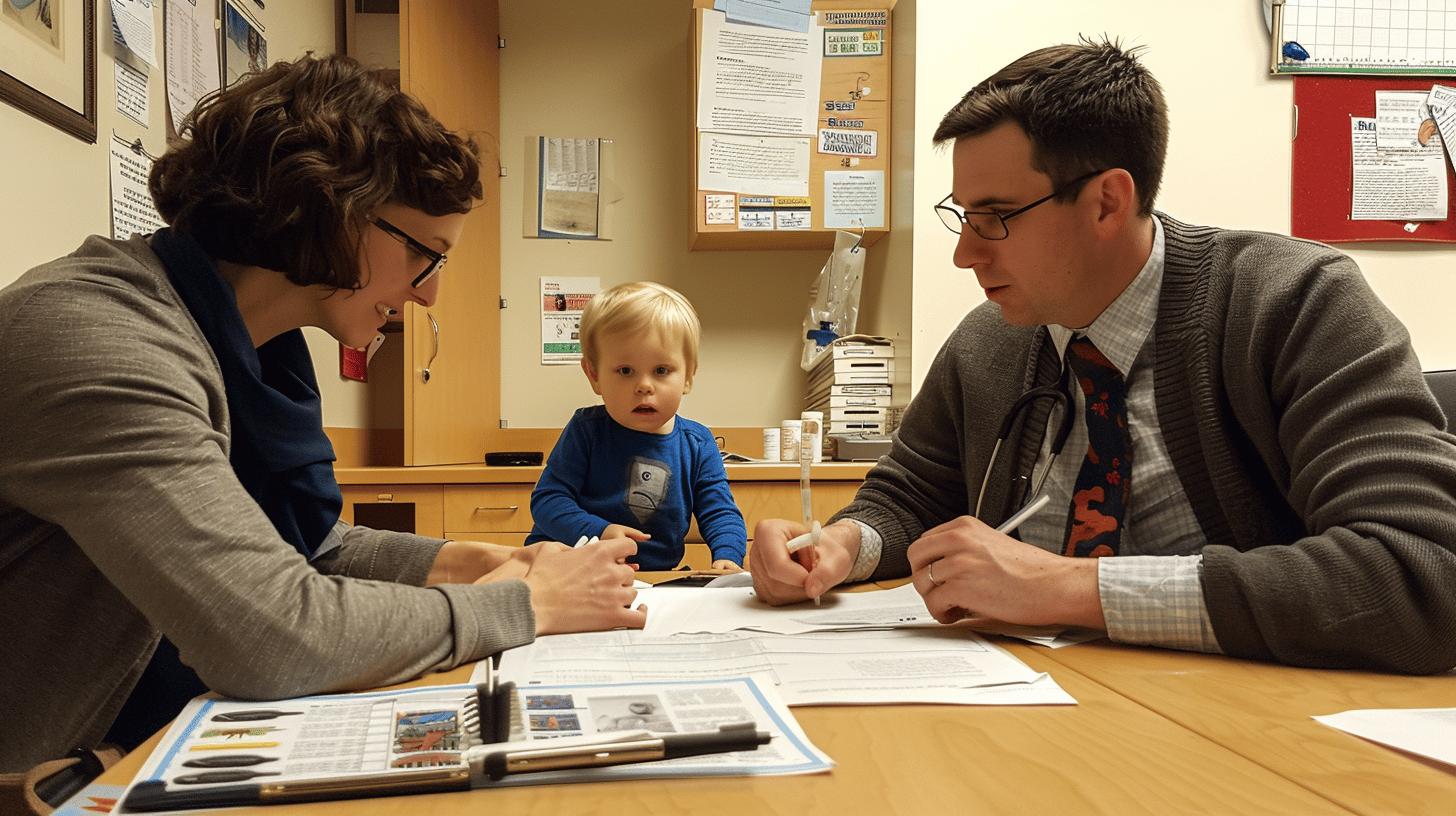What if you could unlock your child’s full potential early on by identifying developmental challenges before they become obstacles? Neurodevelopmental evaluations are crucial in diagnosing conditions like Autism Spectrum Disorder (ASD) and ADHD at their earliest stages. By understanding your child’s unique cognitive, social, and communicative abilities, you can pave the way for targeted interventions and personalized treatment plans. Discover how these evaluations can be transformative for your child's future and why early diagnosis is essential for long-term success. Read on to dive deeper into the life-changing benefits of neurodevelopmental evaluations.
What is a Neurodevelopmental Evaluation?
A neurodevelopmental evaluation is a comprehensive assessment aimed at evaluating a child's cognitive, physical, communicative, and social development. These evaluations are essential for identifying and diagnosing neurodevelopmental disorders, allowing for timely intervention and tailored treatment plans.
- Cognitive abilities
- Physical development
- Communication skills
- Social development
- Behavioral patterns
The primary purpose of a neurodevelopmental evaluation is to gain a holistic understanding of a child's developmental progress. This understanding aids in diagnosing conditions like autism, ADHD, and other developmental delays. Early identification of these conditions can significantly improve the child's long-term outcomes.
Early intervention is crucial for addressing developmental concerns. Tailored treatment plans, based on the evaluation's findings, can help children reach their full potential. These plans often involve specialized educational strategies, therapeutic interventions, and support systems designed to address the unique needs of each child.
The Process of a Neurodevelopmental Evaluation

The neurodevelopmental evaluation process begins with an initial consultation to gather the child's medical history. This step includes discussing developmental milestones, family history, and any concerns from parents or guardians. This information provides a foundation for understanding the child's background and helps tailor the evaluation to their specific needs.
- Cognitive tests
- Motor skill assessments
- Communication tests
- Social interaction evaluations
- Behavioral observations
A multidisciplinary team is essential for a thorough evaluation. This team typically includes psychologists, pediatricians, speech therapists, and occupational therapists. Each professional brings specialized knowledge that contributes to a comprehensive assessment. For example, a psychologist may focus on cognitive tests, while a speech therapist evaluates communication skills. The collaboration among these experts ensures a well-rounded understanding of the child's developmental status.
The length of the evaluation process can vary. It may range from a single-session brief screening to more extended assessments spread over several sessions. Brief screenings are often used for initial identification of potential issues, while detailed assessments provide an in-depth analysis of the child's abilities and challenges. The duration depends on the complexity of the child's needs and the specific tests required to obtain a complete picture of their development.
Conditions Assessed Through Neurodevelopmental Evaluations
Neurodevelopmental evaluations are essential for identifying a range of developmental disorders. The primary conditions assessed include Autism Spectrum Disorder (ASD), Attention-Deficit/Hyperactivity Disorder (ADHD), and Intellectual Disabilities (ID).
Autism Spectrum Disorder (ASD)
ASD is characterized by challenges in social interaction, communication, and repetitive behaviors. Symptoms can vary widely in severity and may include difficulties in understanding social cues, maintaining conversations, and engaging in typical social activities. Children with ASD often have restricted interests and may engage in repetitive movements or behaviors. Early diagnosis is crucial for implementing interventions that can significantly improve social and communicative skills.
Attention-Deficit/Hyperactivity Disorder (ADHD)
ADHD involves persistent patterns of inattention, impulsivity, and hyperactivity. Children with ADHD may struggle to focus on tasks, follow instructions, or complete schoolwork. They might also exhibit impulsive behaviors, such as interrupting others or acting without considering the consequences. Hyperactivity can manifest as constant movement, fidgeting, or an inability to stay seated. Proper diagnosis through neurodevelopmental evaluations helps in creating tailored strategies to manage symptoms and improve daily functioning.
Intellectual Disabilities (ID)
ID is marked by limitations in intellectual functioning and adaptive behavior. These limitations affect conceptual, social, and practical skills, making it challenging for children to perform age-appropriate tasks. Intellectual functioning is typically assessed through standardized tests that measure cognitive abilities. Adaptive behaviors are evaluated by observing how well a child can adapt to various everyday situations. Identifying ID early allows for the development of educational and therapeutic programs to support the child's growth and development.
|Condition|Key Characteristics|
|—|—|
|Autism Spectrum Disorder (ASD)|Social interaction difficulties, communication challenges, repetitive behaviors|
|Attention-Deficit/Hyperactivity Disorder (ADHD)|Inattention, impulsivity, hyperactivity|
|Intellectual Disabilities (ID)|Limitations in intellectual functioning, adaptive behavior challenges|
Preparing for a Neurodevelopmental Evaluation

Preparation is crucial for an accurate neurodevelopmental evaluation. Properly preparing ensures the evaluation team has all the necessary information to make a thorough assessment. This involves collecting relevant medical and educational records and noting developmental milestones and behaviors. The more comprehensive the preparation, the better the evaluation will reflect the individual's true abilities and challenges.
- Gather medical and educational records
- Note developmental milestones and behaviors
- Prepare the individual for the process
- Communicate with the evaluation team
- Address any questions or concerns beforehand
Common concerns include anxiety about the evaluation process and uncertainty about what it entails. Addressing these concerns early can help reduce stress. Explain the steps of the evaluation to the individual, and emphasize that the goal is to understand and support their development. Open communication with the evaluation team can also alleviate worries, as it ensures everyone is on the same page and ready to address any issues that may arise.
Interpreting the Results of Neurodevelopmental Evaluations
Neurodevelopmental evaluations yield various types of results, providing insights into a child's cognitive abilities, emotional functioning, and developmental challenges. These results typically include scores and metrics from standardized tests that measure different aspects of development. Understanding these metrics is essential for interpreting the evaluation accurately and forming a comprehensive picture of the child's strengths and areas needing improvement.
- IQ scores
- Developmental scales
- Behavioral assessments
- Social interaction scores
- Communication metrics
Using the results of a neurodevelopmental evaluation involves identifying both strengths and weaknesses. IQ scores, for example, can reveal cognitive strengths that might be leveraged in educational settings, while developmental scales can highlight areas where the child is lagging behind typical developmental milestones. Behavioral assessments provide insights into emotional and behavioral functioning, helping to identify any disruptive behaviors that need to be managed.
Identifying strengths and weaknesses is the first step in formulating individualized recommendations. For example, social interaction scores and communication metrics can guide the development of social skills training and speech therapy. By pinpointing specific challenges and abilities, professionals can create tailored intervention plans that support the child's overall development. These recommendations might include specific educational strategies, therapeutic interventions, and support systems designed to address the unique needs identified through the evaluation.
The Benefits of Early Diagnosis Through Neurodevelopmental Evaluations

Early diagnosis through neurodevelopmental evaluations is crucial for achieving better outcomes. Identifying developmental disorders at an early stage allows for timely interventions that can significantly improve a child's quality of life. These evaluations help in understanding a child's unique strengths and weaknesses, which is essential for creating tailored intervention plans. By addressing developmental issues early, children can receive the support they need to thrive academically, socially, and emotionally.
- Tailored educational plans
- Early intervention services
- Improved academic performance
- Enhanced social skills
- Better long-term outcomes
Overall, early diagnosis has a profound impact on a child's development and quality of life. It enables parents, educators, and healthcare providers to implement strategies that support the child's growth and development effectively. Early intervention can mitigate the challenges associated with developmental disorders, leading to more positive long-term outcomes. By identifying and addressing issues early, children are better equipped to reach their full potential.
Final Words
In the action, neurodevelopmental evaluations play a crucial role in assessing cognitive, physical, communicative, and social development. The evaluation process begins with consultations, followed by various tests conducted by a multidisciplinary team. It assesses conditions like Autism Spectrum Disorder, ADHD, and Intellectual Disabilities.
Preparing for a neurodevelopmental evaluation is essential for accurate assessments and involves gathering relevant information and addressing concerns. Interpreting the results helps identify strengths and weaknesses, leading to tailored recommendations. Early diagnosis through neurodevelopmental evaluations ensures timely interventions and better long-term outcomes. Ultimately, understanding the neurodevelopmental evaluation process can significantly impact a child’s growth and development.
FAQ
What is neurodevelopmental evaluation?
A neurodevelopmental evaluation is a comprehensive assessment of cognitive, physical, communicative, and social development, primarily in children. It aims to identify and diagnose neurodevelopmental disorders, facilitating early intervention and tailored treatment plans.
What are the main aspects assessed during a neurodevelopmental evaluation?
The main aspects assessed during a neurodevelopmental evaluation include:
- Cognitive abilities
- Physical development
- Communication skills
- Social development
- Behavioral patterns
How long does a neurodevelopmental evaluation take?
The length of a neurodevelopmental evaluation can vary. It ranges from single-session brief screenings to more extended assessments with multiple sessions.
What are the 5 neurodevelopmental disorders?
The five neurodevelopmental disorders include:
- Autism Spectrum Disorder (ASD)
- Attention-Deficit/Hyperactivity Disorder (ADHD)
- Intellectual Disabilities (ID)
- Specific Learning Disabilities (e.g., Dyslexia)
- Developmental Coordination Disorder
Who conducts neurodevelopmental assessments?
Neurodevelopmental assessments are carried out by a multidisciplinary team. This team typically includes psychologists, pediatricians, speech therapists, and occupational therapists.
What is the difference between neurodevelopmental and neuropsychological evaluations?
Neurodevelopmental evaluations focus on cognitive, physical, communicative, and social development in children. Neuropsychological evaluations focus more on cognitive function, behavior, and mental health, often in older children and adults.
Why is early intervention important in neurodevelopmental evaluations?
Early intervention is crucial because it allows for the implementation of targeted treatment plans. These plans can improve developmental outcomes and quality of life.
How can I prepare for a neurodevelopmental evaluation?
Preparation steps include:
- Gather medical and educational records
- Note developmental milestones and behaviors
- Prepare the individual for the process
- Communicate with the evaluation team
- Address any questions or concerns beforehand


